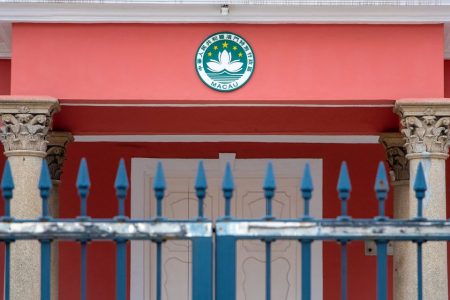Most of the new criminal offences to be listed in the local national security law’s amendment bill will be punishable by one to 10 years in prison, Secretary for Security Wong Sio Chak has said.
The Macao government launched a public consultation on 22 August on the draft of its national security law’s amendment bill, which aims to ensure that Macao’s legal system for the protection of national security will be as capable of safeguarding national security as the respective laws in mainland China and Hong Kong. The 45-day public consultation will end on 5 October.
The government has indicated that it aims to submit the amendment bill to the Legislative Assembly (AL) by the end of this year for debate and vote, after the completion of the ongoing public consultation process.
According to Wong, only those who have the clear intent of endangering national security will be punished by the local national security law, both according to the current version and the future version.
Wong made the remarks on Saturday during a public consultation session on the amendment bill for members of the general public. The session was held at the Services Platform Complex for Commercial and Trade Cooperation between China and Portuguese-speaking Countries in Nam Van.
Saturday’s session, which was hosted by Wong, was attended by around 200 residents, 25 of whom raised their opinions and suggestions during the session, which lasted around 3.5 hours.
The government-proposed amendments to the local national security law aim to make Macao more capable of tackling non-traditional threats to national security and to strengthen the local government’s ability to prevent external hostile forces from interfering in Macao affairs or engaging in activities aiming for secession, subversion, penetration or destruction of the nation.
The local government is proposing to extend the coverage of certain existing criminal offences listed in the local national security law and to add new criminal offences to the law.
Macao enacted its national security law – the Law on Safeguarding National Security Law – back in 2009, based on the Article 23 requirement of the Macao Basic Law.
Macao’s national security law, Law 2/2009, has never been amended since its enactment in 2009.
Article 23 of the Macao Basic Law states that the Macao Special Administrative Region shall enact laws, on its own, to prohibit any act of treason, secession, sedition, subversion against the Central People’s Government, or theft of state secrets, prohibit foreign political organisations or bodies from conducting political activities in the MSAR, and to prohibit political organisations or bodies in the MSAR from establishing ties with foreign political organisations or bodies.
The current version of the local national security law lists the five crimes of endangering national security stated by Article 23 of the Macao Basic Law and their respective penalties, namely treason, secession, sedition, subversion against the central government, and theft of state secrets.
The current version of Law 2/2009 also lists additional punishments concerning foreign political organisations or bodies that commit the five crimes endangering national security in the MSAR, and additional punishments regarding Macao-based political organisations or bodies that establish ties with their foreign counterparts for committing the five crimes.
According to the current version of the local national security law, treason, secession, and subversion against the central government (Article 1, 2 and 3) are each punishable by a prison term of between 10 and 25 years.
According to the current version of the local national security law, the crime of sedition, as enshrined in Article 4, is punishable by imprisonment of between one and eight years. Sedition listed in the current version of the law covers those who publicly and directly incite others to commit treason, secession or subversion against the central government.
Theft of state secrets, as defined by Article 5 of the current local national security law, refers to those who steal, gather or procure state secrets, endangering or harming national independence, the unity and integrity of the state or its internal or external security. Offenders face a prison term of between two and eight years.
However, according to Article 5, those who engage in such activities after receiving instructions, orders, money or valuables from governments, organisations or bodies outside the MSAR face a prison term of between three and 10 years.
In the ongoing public consultation, the local government proposes that secession or subversion by non-violent illegal means should also be punishable, a change from the current version of the local national security law which only covers those who use violence or other grave illegal means in an attempt to engage in such activities.
The ongoing public consultation proposes to add a number of new criminal offences to the local national security law, such as the crime of instigation or support of sedition, according to which those who instigate or support others to commit treason, secession or subversion against the political power ruling the nation should also be punishable.
The law’s current version only refers to the central government.
During Saturday’s session, Wong noted that the maximum 25-year prison terms for certain criminal offences listed in the current local national security law are very heavy punishments. Wong said that the newly proposed criminal offences to be listed in the amended version of the law should carry a reasonable length of imprisonment, adding that the government-proposed amendment bill does not aim to impose grave punishments on potential offenders, The Macau Post Daily reported.
Meanwhile, Wong also said that the local government was aware that some public servants in Macao had “liked” posts on social media concerning Hong Kong’s 2019 violent protests against the government.
Wong said that while to “like” such posts is not a criminal offence, this could be a “dangerous” signal concerning Macao’s protection of national security, and this could be an indication that some problems might have happened in Macao’s education and national security culture.






